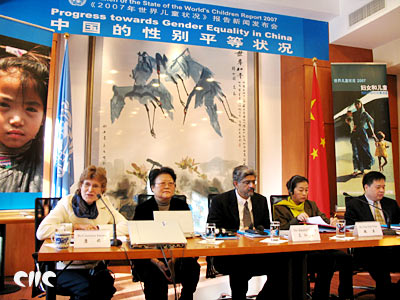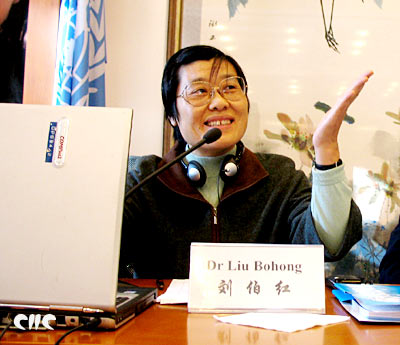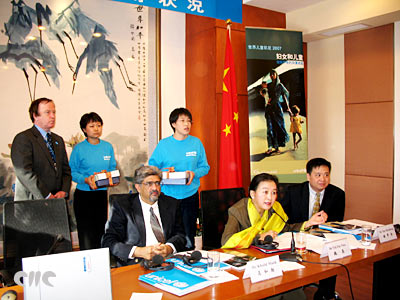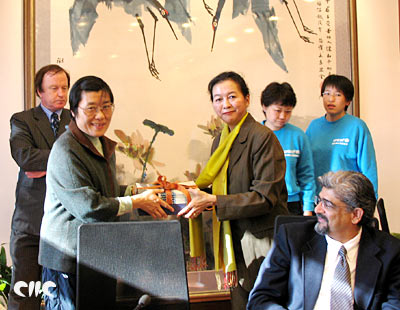| Tools: Save | Print | E-mail | Most Read |
| Gender Equality: 'Double Dividend' for Women and Children |
| Adjust font size: |
“Although China has made conspicuous progress towards gender equality, there’s still progress needed in the schools, the workplace and in political participation to achieve the Millennium Development Goal
The report is UNICEF’s annual flagship publication which closely examines a key issue affecting children. The theme of the report is “women and children – double dividend of gender equality.” The launch of the Chinese edition of the Report was hosted Friday by the UN Theme Group on Gender at their main compound in Beijing. It’s the first time that the Report has been issued by UNICEF jointly with its cooperative agencies in China. It recognizes the commitment of the UN System and its government and non-government counterparts to achieve the Millennium Development Goals (MDGs). The latest UNICEF report concludes that eliminating gender discrimination and empowering women will have a profound and positive impact on the survival and well-being of children. It is pivotal to the health and development of families, communities and nations. UN Residence Coordinator Mr. Khalid Malik opened the event by emphasizing the importance of the eight MDGs and their strong linkage with balanced development or “xiaokang” as highlighted by the Chinese government. “Gender equality – goal number three – needs to be a commitment of all society at all levels to ensure that development is truly balanced,” he said. Taking the launch event as an opportunity, Professor Liu Bohong from the Women’s Studies Institute of the All China Women’s Federation (ACWF) gave a presentation on gender equality in China. She said that despite the progress made, the country continued to fall behind the standards on gender equality set by the UN for education, employment and political representation. “It’s a big challenge for China to achieve the MDGs,” she said.
Prof. Liu said the seats held by Chinese women in the People’s Congress at all levels around the country ranked 12th in the world in 1994. However, it came 24th in 2000 and plummeted to 48th this summer. In addition, Chinese women didn’t get equal treatment in the workplace. According to China’s 2000 national census, women made up 45 percent of the workforce, a significantly higher percentage than the world average of 35 percent, yet their average income that year was only 80 percent of that paid to men. The Report states that women’s increased involvement in politics could have a positive impact on the well-being of children. Growing evidence from industrialized and developing countries suggests that women in legislative bodies have been especially effective advocates on behalf of children. The Report sets out a roadmap to gender equality by identifying seven key issues. One of them is to implement legislative quotas which are a proven method of ensuring women’s participation in politics. Of the 20 countries with the most presentation of women in parliament, 17 use some form of quota system. Zhang Youyun, deputy director of the China Association for Employment Promotion, also made comments at the event as a recipient of a grant from the UN Gender Facility. Zhang is hosting a project funded by the grant to promote China’s first Employment Promotion Law. It’s to be submitted to the National People’s Congress next year for examination and approval as a gender sensitive law.
Yao Shenhong, a representative of the Ministry of Commerce, UNICEF’s coordinating counterpart, and Prof. Liu Bohong, representing the ACWF, UNICEF’s long-standing partner, formally accepted Chinese copies of The State of the World’s Children 2007 from the new UNICEF Representative in China, Dr. Yin Yin Nwe. On Friday Dr. Yin Yin Nwe said UNICEF had agreed to spend US$100 million between 2006-2010, funding children’s issues in China.
(China.org.cn by Zhang Tingting, December 15, 2006) |
| Tools: Save | Print | E-mail | Most Read |
 |
| Related Stories |
|
Product Directory China Search |
Country Search Hot Buys |



